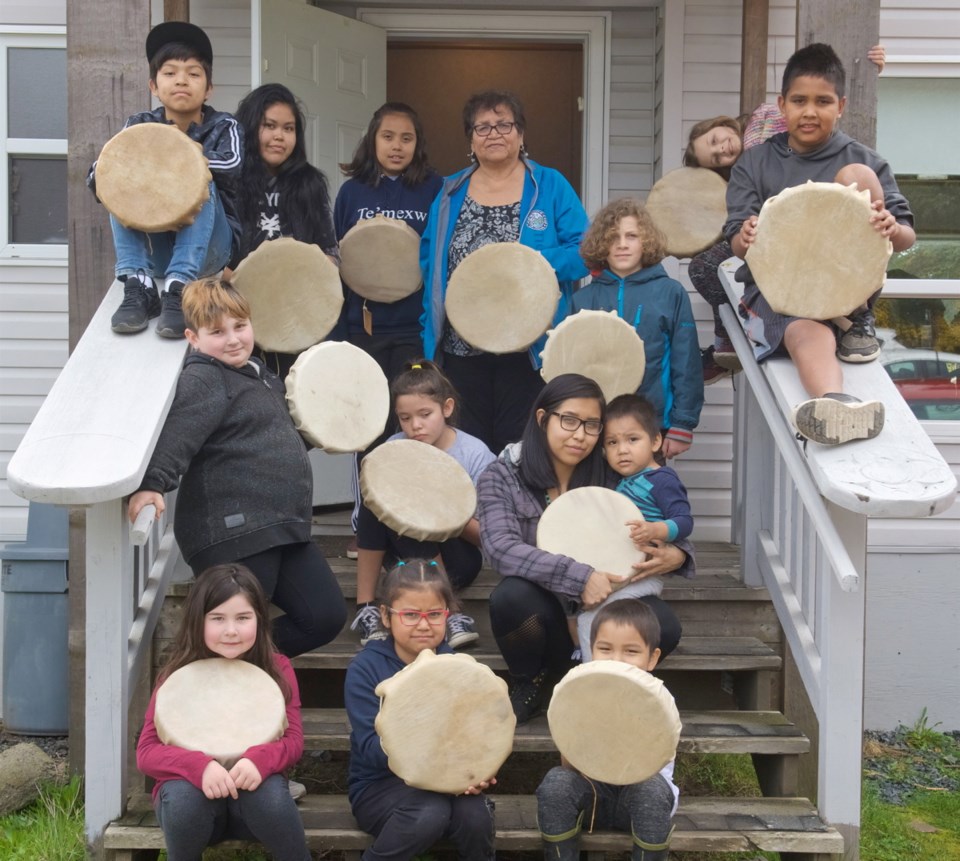About three years ago, I attended an event at Royal Bay Secondary School with my daughter and we watched the Beecher Bay Youth Drum Group perform with Chief Russ Chipps.
My daughter approached Chipps after the presentation and said she had a drum at home, too. He asked her if she ever played it and she said no. He invited her to join the children at Beecher Bay First Nation so she could learn to drum.
The first time I took her, she sat with the kids and I grabbed a chair outside the circle. After the first practice, I was told that I was expected to learn the songs and sing, too.
“The adults need to sing to help the kids feel more comfortable,” said Chipps.
This was something very outside of my comfort zone, but I participated and have continued for years. I have learned many songs alongside my daughter, the children and other parents from Beecher Bay. The lesson I learned is that something powerful happens when you participate in other cultures, rather than just observe.
Elder Isabelle Charles started the Beecher Bay Youth Drum Group about four years ago.
“We are invisible,” said Charles. “We are trying to capture what’s left of our culture. It’s one step in the right direction.”
The Beecher Bay Youth Drum Group has been performing all over our region at various events. I’ve watched the group grow from a handful of kids to more than 30 members, including about 20 children and their parents and elders.
“We didn’t recruit, the kids just started coming,” said Charles.
Charles, her parents and grandparents all attended residential school and lived with the repercussions from the experience.
“My kids are the first generation to not go to residential school,” Charles said.
About two weeks ago, I had one of my proudest moments at Beecher Bay First Nation. We worked together to host a drum-making day when every child in the group could make their own drum. Many children didn’t have their own drums, and they would share and rotate drums at practices and performances.
“In our culture, drums are earned; they aren’t given,” said the group’s mentor, Raymond Jones Peter Jr. “We believe the drums are alive and the drum becomes a part of you. The children are learning the culture of our ancestors.”
I spoke with the chief and council and Peter about wanting to find a way to get the kids drums. I wanted to find a grant. After presenting at a conference together, Carmen Driechel, a community and Indigenous relations manager for Fortis B.C., and I were chatting and I shared this goal. Driechel said Fortis B.C. would be interested in partnering, so we met with the nation the following week.
Everything came together and it was the best display of partnership and friendship I’ve ever seen. I never planned it would be a column topic, but the way everyone came together is a story that needs to be shared.
First, Beecher Bay opened its doors and welcomed many organizations to learn and participate in the cultural teaching of drum-making.
“Even our ancestors who couldn’t be there were watching the younger generation working together,” Peter said. “Our next generations are winning and it’s because we are opening our doors to everyone. We don’t close doors. It’s important to share what you are taught.”
Sooke Family Resource Society supplied a lunch, Fortis B.C. provided drum kits and I was able to bring volunteers from my office to help the children make their drums. We all learned together.
It was an incredible experience learning to stretch a deer hide over a wood frame and fashion it with sinew. It was a traditional skill that I never had the opportunity to learn until that day.
The event came full circle when I learned Peter was a former Fortis B.C. employee of 25 years. Peter has been teaching the youth songs for years and sharing his stories and cultural knowledge along the way, too. Peter said he has seen organizations such as Fortis B.C. move toward understanding and acknowledging Indigenous culture and said it is how things should be.
As I look back on the afternoon, I realize that the lessons that came out of the day are louder than the sounds of the drums. It’s all about working together, and that’s how we strengthen our communities.
Charla Huber is the director of communications and Indigenous relations for M’akola Group of Societies.



